Curated OER
Famous Virginians
Fourth graders research the lives of famous people from Virginia. Using the internet, they take notes in a blank flipbook given to them by their teacher. They write a speech in first person of the famous Virginian they researched and...
Curated OER
Language Arts Vocabulary Database
Learners read a selection and identify the vocabulary words for the current week. Individually, they use the words to write in complete sentences and put the words into a database. They also practice their typing skills and must keep...
Curated OER
Make Way for Ducklings
First graders use skills to collect, organize, and interpret data. They compare and contrast two stories, Make Way for Ducklings and Chibi: A True Story From Japan. Students create a duckling.
Curated OER
Pizzeria (reading Encouragement)
Students create a pizzeria atmosphere in the classroom with Italian music, pizza menus and checkered table cloths. They compare their different tastes in pizza toppings to different tastes in reading. Then they use a reading menu to...
Curated OER
A Day During Colonial Times
Fifth graders participate in read aloud activities of three books about life in Colonial times. They compare their life to that of children of Colonial times using a Venn diagram. They draw a picture and write about what a day in the...
Curated OER
When Worlds Collide
Students research on a focused topic. They gather information from a range of sources and orally cit it in a presentation. Students connect information acquired in previous lessons with research on the assigned topic. They research...
Curated OER
A Man of Integrity and Courage
Students read one of the most important articles in modern medical history on the importance of conducting research in an ethical manner that includes participants who give informed consent.
Curated OER
Book Review
Students write a five paragraph theme that explains how the novel which they read in this unit effectively utilized various literary elements to portray the impact of a disease on a population. They then decide which three literary...
Curated OER
A Sense of Place
Students identify and describe one or two places significant to them using vivid language. They describe one of those important places in accurate, evocative language showing an original perspective.
Curated OER
Language Arts: Survival Diaries
High schoolers are able to compose a dialectical journal entry which analyzes information presented in a text. They are able to compose a creative journal entry which develops characters, presents events in logical order, and includes...
Curated OER
Time to Read
High schoolers identify how the literary elements of theme, point of view, characterization, setting, and plot illustrate the effects of a certain disease on a community. They identify the aspects of the book that are specific to the...
Curated OER
Literary Circles
Students use correct grammar, spelling and capitalization in their writing. They connect information acquired in history and science classes with the events described in the books that were read. Students make a clear and informative...
Curated OER
Grounded for Life
Second graders become familiar with the lives of penguins including their life cycles, habitats and basic needs. Students will experience the lives of penguins through stories and video.
Curated OER
Voices at Whisper Bend
High schoolers examine life in Pennsylvania during and after World War II. Using primary source documents, they compare the unity of the United States during World War II and the Iraq War. They also discover how citizens adapt to the war...
Curated OER
Tasmanian Time Travel
Sixth graders perform research using the Internet about the Tasmanian Devil. The project can be presented in a variety of ways. The use of computer software is important for students to know, specifically Hyperstudio.
Curated OER
What's on Your Plate?
Students travel the world. For this global studies lesson, students research selected countries and investigate their cultural traditions.
ReadWriteThink
Read Write Think: Animal Study From Fiction to Facts
Contains plans for five 50-minute lessons that ask students to compare and research information about animals from fiction and nonfiction texts. In addition to student objectives and standards, these instructional plans contains links to...
ReadWriteThink
Read Write Think: Blending Fiction and Nonfiction
Contains plans for four class periods that ask students to blend narrative and expository writing after reading fiction and nonfiction selections. In addition to student objectives and standards, these instructional plans contains links...
Better Lesson
Better Lesson: Analyzing Text Complexity of Non Fiction Sources
This instructional activity will help students read and comprehend nonfiction, specifically biographies, through determining criteria for text complexity. Included is a PDF and Smart Notebook titled Determining Text Complexity, and an...
British Library
British Library: 19th Century Non Fiction Texts: Work & Welfare
This thematic collection will allow students to read and understand 19th-century non-fiction texts, and support them in identifying key features for a range of genres, audiences, and purposes. Each source is accompanied by original...
British Library
British Library: 19th Century Non Fiction Texts: Gender, Behaviour & Etiquette
This thematic collection will allow young scholars to read and understand 19th-century non-fiction texts, and support them in identifying key features for a range of genres, audiences, and purposes. Each source is accompanied by original...
Florida Center for Reading Research
Florida Center for Reading Research: Fiction and Nonfiction Sort [Pdf]
A lesson plan in which learners look at different books, write their titles, and sort them according to whether they are fiction or nonfiction. Materials are included.
South Carolina Educational Television
Know It All: Non Fiction Text Features
Fifth graders will use non-fiction books to identify and explain how text features help them as individual readers.
ReadWriteThink
Read Write Think: Reading/writing About Whales Using Fiction and Nonfiction Texts
Students will have a whale of a good time in this lesson in which they use fiction and nonfiction texts to write a letter to an online scientist.
Other popular searches
- Genre Fiction and Nonfiction
- Fiction and Nonfiction Text
- Nonfiction and Fiction
- Fiction Nonfiction Books
- Fiction and Nonfiction Events
- Fiction vs Nonfiction Books
- Nonfiction Fiction
- Twinning Fiction/nonfiction
- Fiction or Nonfiction Unit
- Fiction vs. Nonfiction Books
- Fiction/nonfiction Books
- Identify Fiction Nonfiction

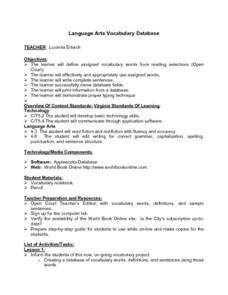





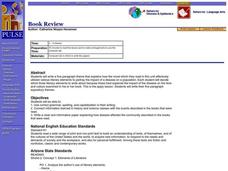


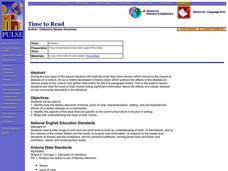
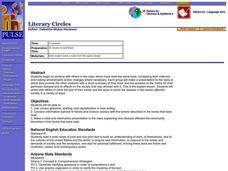
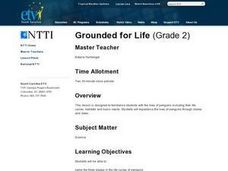

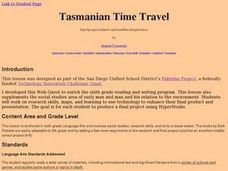





![Florida Center for Reading Research: Fiction and Nonfiction Sort [Pdf] Lesson Plan Florida Center for Reading Research: Fiction and Nonfiction Sort [Pdf] Lesson Plan](https://content.lessonplanet.com/knovation/original/509105-4469283d2301f2d80ae09183a55b8e2c.jpg?1661786967)
